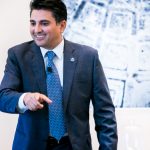As a part of our talent acquisition engagements, we ask our clients how they define “top talent” and how they would assess those traits in the interview process. Reflecting on the insightful comments we hear every day, we thought there would be great value in a new blog in which senior executives/thought leaders share their “Take on Talent.”
This is the twenty-third in a series of blogs/interviews with senior executives who are thought leaders in the areas of Talent Acquisition, Career Development and Leadership who will share their perspectives on this ever present question.
 Kevin S. Parikh is the Chief Executive Officer and Chairman of one of the world’s leading Business Transformation, Technology Strategy and Sourcing Advisory firms, Avasant.
Kevin S. Parikh is the Chief Executive Officer and Chairman of one of the world’s leading Business Transformation, Technology Strategy and Sourcing Advisory firms, Avasant.
As an attorney by trade, Parikh specializes in negotiating complex global transactions working to bridge the gaps between legal counsel and business team objectives. Over his career, Parikh has been involved in more than 350 IT sourcing and business transactions. These deals have ranged from US$20 million to US$2.5 billion, involving major Tier 1 and Tier 2 service providers.
A renowned author, and industry leader, Parikh regularly speaks at economic development forums, including the World Bank and United Nations SDG forums.
Parikh’s book, Digital Singularity: A Case for Humanity, lays out the opportunities and challenges technology’s omnipresence poses, while providing a framework for approaching innovation and remaining competitive in a digital world.
Before joining Avasant, Parikh led the Global IT Sourcing practice at Gartner Consulting. Mr. Parikh specialized in IT and business process (BP) outsourcing, contract and service?level negotiations, joint ventures, captive centers, strategic management, business risk evaluation and software licensing. His practice engaged in both nearshore and offshore sourcing solutions.
In 2011, following a grant from the Rockefeller Foundation, Parikh founded the Avasant Foundation, focusing on youth training and employment for the digital economy.
Parikh received his Juris Doctorate from American University, Washington College of Law, and his bachelor’s degree from University of California, Davis.
Please share with us the top five characteristics (in priority order, first to fifth) of the most talented people you have encountered during your career, and your definition of each.
Integrity: People who do the right thing. Those who possess a strong moral compass and embody a set of high-character principles are the people I strive to surround myself with, in life and bring onto our team.
Intellectual Curiosity/Creativity: People who have a deep and persistent desire to learn. Seeking to understand the world around us drives innovation and allows us to achieve great things. Curiosity ignites creativity, which inspires others to think outside the box to solve grand challenges. This is an inherent part of our team’s DNA.
High EQ (Emotional Intelligence): Those who are highly self-aware of their thoughts and emotions, and how they control and express them to make better decisions, solve problems, and communicate with & lead others. Many studies have shown that Emotional Intelligence is essential for personal and professional success, and I believe it enables one to have greater empathy and remain calm while looking objectively at opportunities from different perspectives.
Responsibility: Taking ownership for one’s actions. We strive to maintain a culture of empowerment and trust, as transparent accountability is a core part of developing talent on any team. The most dynamic and talented people I have come across during my career live by this motto, and they are unstoppable.
Vision/ Passion: Working with purpose and a clear vision. Enables innovation, drives focus and enhances the desire to pursue excellence. When you are passionate about the work you do and have a clear vision, others will be motivated to adopt the same mentality.
When people who embody these five characteristics above come together, it enables greater collaboration and a stronger unified team.
How do you communicate these characteristics to your HR and senior management team?
I believe having a shared consciousness around our core values is fundamental to shaping the future of our organization and continuing to build our team. We pride ourselves on having a lateral organizational structure that leads by example and welcomes open communication and collaboration to ensure everyone is aligned. Culture is omnipresent and must spread in all directions and at all levels. Our Leadership team is fully aligned and actively communicate throughout the organization to reinstall this way of thinking. The characteristics mentioned above are the foundation of our company’s culture, and we are continually engaging our team to reinforce these values and evolve as a collective whole. Through our training, mentor ship program where senior mentors work with their mentees to guide and help them achieve our company values, and annual global offsite, where we bring the entire company together to spend quality time together dedicated to reinforcing our company values, our ideals touch every aspect of our organization. Additionally, when recruiting new talent, our candidates most often come from our employees, which further promotes our strong company culture and mission.
How do you handle challenges to the existing culture by talent you have brought in?
When building a diverse, global team, it is paramount to invest in resources and influential leaders who become advocates of culture, and drive it consistently across the board. We are growing quickly, and attracting talent with diverse skills, work experiences, and geographies. We pride ourselves on welcoming new perspectives, as I believe fresh ideas have the power to make our team that much better. Culture is the most difficult aspect of a successful business to build, and the easiest to lose. With that said, handling challenges with a new hire can be difficult. I think it is important to diagnose if someone is seeking to change our core values (which have not wavered) or help the organization evolve positively. We have invested in certain programs like our fitness program Avafit, social platforms like Yammer, to build culture. We encourage practice leadership at our annual offsite and encourage employees to explore their passions in areas where they want to grow that is aligned with the company mission




